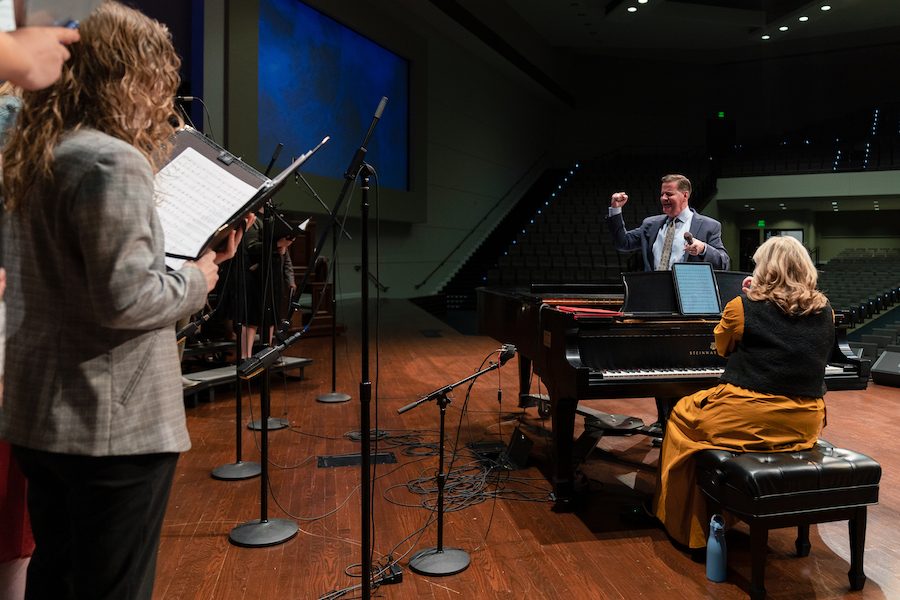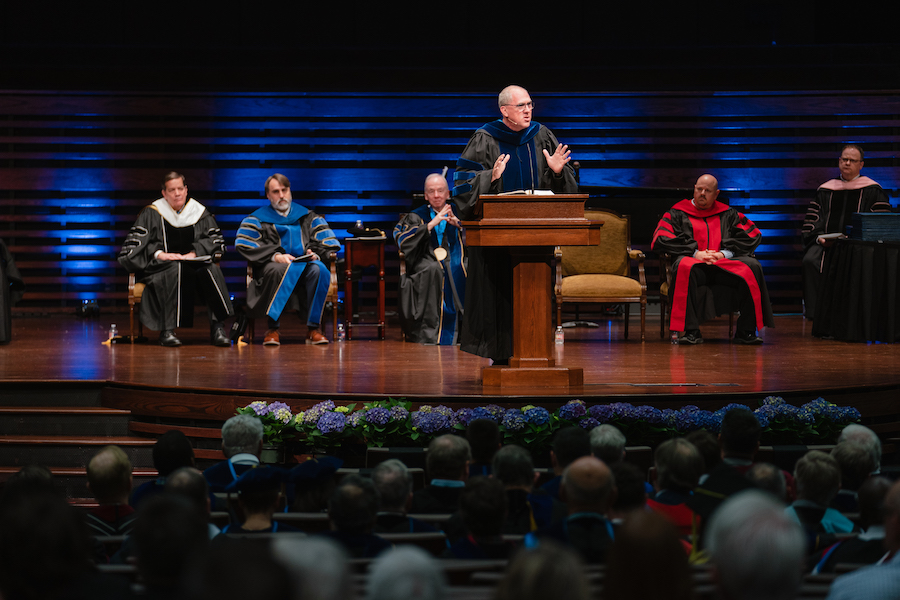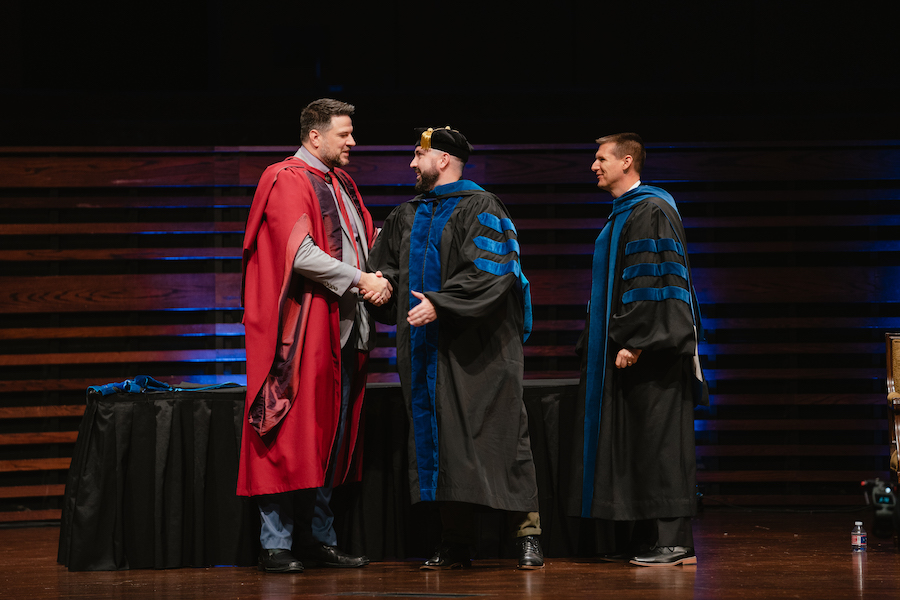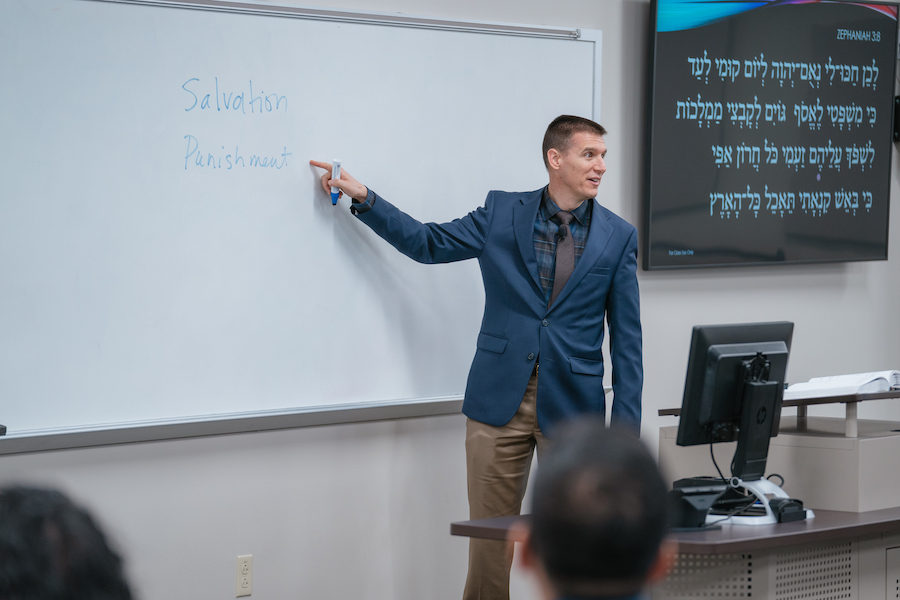George says Reformation still applies today


The process of church reform must continue today, noted theologian and scholar Timothy George told Southwestern Baptist Theological Seminary and Texas Baptist College (TBC) students during a conversation on the Reformation and the Christian life held on Feb. 11.
In his introduction of the founder of Beeson Divinity School, Justin Wainscott, assistant professor of Christian ministry at TBC and former student of George’s at the Alabama-based school, described the acclaimed author as a “renowned historian and scholar of the Reformation” who has written several books on the Reformation, including a “classic work of theology of the Reformers” that is used in seminaries and colleges within the country and worldwide.
Wainscott, who facilitated the hour-long conversation, posed questions to George about his life, his interest in the Reformation, and his thoughts on why the Reformation is still applicable today.
George, who preached in the Fort Worth’s school Feb. 10 chapel service, said he became interested in the study of the Reformation because he “was interested in what has happened in the past and how it shapes our life and world and worldview today.”
Raised in Chattanooga, Tennessee, by two great-aunts who took him to a small church where he first heard the Gospel, George said his study of the Reformation came as he began to study the early church as a Master of Divinity student at Harvard Divinity School.
“The more I studied the Reformation, the more I saw continuity between what the Reformers were doing and saying, and what the early Christian fathers were doing and saying,” George explained. The Reformation “is another way to say” what the early church fathers were saying “in a different time.”
George said the Reformation was a “retrieval” of “the good, wonderful treasures that are there in the Gospel, most of all in the Bible, for sure.”
Explaining the reason for the Reformation was that the church in the 16th-century needed to be “refurbished,” George said the process of the Reformation should continue today.
“We need those clarion calls that were issued in the Reformation of the 16th century, to be stated again in our own day in our own language, to address issues that we have today,” George commented. Though “human beings make progress, … we lapse back also and we need somebody to help us move forward once again.”
Wainscott noted themes of George’s writings around the 16th-century movement include characterizing the “spiritual struggle” at the heart of Reformation spirituality “is the experience of the Christian life as conflict, contention, trial, testing, [and] assault.”
George said the Reformation is about a person’s relationship with God, including what happens in their hearts, lives, and heads, observing that “what happens for every Christian is that we are called into spiritual combat, spiritual warfare.”
Sola scriptura, or Scripture alone, George said, was one of the “big emphases of the Reformation.” Observing that Martin Luther, leader of the 16th-century movement, came to “his great breakthrough” of justification by faith alone through meditating on Scripture, allowing the Holy Spirit to illuminate his heart and mind, and the “struggle” he had with the Scripture. George said these are still needed in the Christian life today.
“It’s not just an intellectual process,” George said. “It’s a spiritual process. And when you’re facing issues in your life—big issues, hard issues—that’s where you go, you go to the Scriptures.”
George noted two “movements” of the 16th-century that influenced Luther and other leaders of the Reformation, including the invention of the printing press and humanism, defining it in the modern-era terminology of a return to the Greek and Latin vocabulary. The two movements worked in tandem, he said, as the printing press allowed more people to have access to books and to study books in languages that had been “forgotten.” This allowed Luther to translate the Scriptures in German, or the common language of the people, George said, while explaining this led to the translation of the English Bible by William Tyndale.
Wainscott noted some theologians have argued the Reformation led to the division of the church causing the church “to be dismissed” or “diminished” in thinking. George said the church was divided in the Middle Ages, known as The Great Schism of the Church, when the Eastern Church and Western Church separated. Additionally, he said the New Testament writings of Paul and Peter indicated there was division in the church.
“Division is not new in the Reformation,” George said. “In fact, in some ways, you could say what the Reformers were wanting to do, what they intended to do and to some extent failed to do, was to heal the division in the church, to bring the church back together under the authority of the Word of God. That’s really what motivated them at their deepest level, I think.”
George also observed Luther desired for the church to return to biblical community. Though not liked by Luther or John Calvin, George said Anabaptists “understood that the church was a covenanted community,” while explaining covenant is “an organic connection that we have with Christ and with one another in His body, which is the church.”
George concluded by explaining the heart of Reformation spirituality can be found in 1 Cor. 4:7, when Paul asked the believers at Corinth what did they have that they did not receive, who made them different from anyone else, and if they received the gift, why did they boast or glory as those it wasn’t a gift?
“We need a fresh dose of all the solas including the one that is kind of put on as an exclamation point: soli Deo Gloria, to God alone be the glory,” George said. “That’s a good motto for our life, for our posture before God, and it’s a way of understanding what the Reformation was about. It’s not building up our own little self-empire, but it’s whatever we do, whatever we are able to do, we render that as an offering of thanks to our great and awesome God.”



